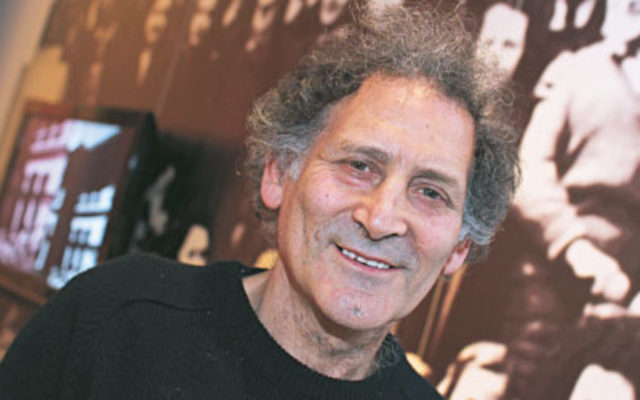Memories of life in the shtetl
ON a Sunday afternoon, in a single-fronted terrace in Carlton, my mother sings Avremele un Yosele. It could be any Sunday afternoon in the 1950s and 1960s. She sings as she attends to her household chores, her black hair tinged with sunlight streaming through the kitchen window.
This is how I remember it – perhaps because of the associations evoked by the opening lines: “Avremele, just take a look, how gloriously the sun does shine.”
I did not know then that the composer of this, and many other songs my mother sang, was Mordkhe Gebirtig, who had the rare talent of writing songs that were instantly received as folk songs. He was a folksmensch, a man of the people. His work reflected their joys and struggles, their fears and aspirations.
I heard Gebirtig sung many times during my childhood, both at home and at Bund gatherings and Kadimah concerts. Years later, in September 1986, I walked the streets of Kazimierz which, since the 14th century, had been a Jewish district of Krakow.
Gebirtig, a carpenter by trade, was born in Kazimierz on May 4, 1877. His cramped workshop was located in a basement in Berek Joselewicz Street. It was here that he wrote the lyrics of his songs and composed the melodies on a feifele, a shepherd’s flute.
In 1986, Kazimierz seemed like a ghost town. The old Remuh Synagogue on Szeroka Square could barely raise a minyan for its services. The legendary streets: Jakuba, Isaaka, Josefa, Miodowa and Krakowska, were lined with crumbling tenements, the walls pockmarked with peeling stucco.
In this setting I could imagine the streetwise swindler of the Gebirtig classic Avreml der marvikher darting through the cobbled squares and alleys, lying in wait, “the filthy rich to collar”. When I came to know the vast scope of Gebirtig’s work I realised it was a misconception to reduce him to a writer of nostalgic songs that yearned for the carefree days of childhood and the lost idyll of the shtetl.
Gebirtig also had a sharper edge, an eye for exploitation and a desire for social justice, intensified by his Bundist outlook. He wrote of unemployment and hunger, of families pulled apart by migration, of sick children and poverty, struggling factory workers and low-paid tradesmen. Life was not easy in the crowded prewar tenements of Kazimierz – and far worse was to come.
The Nazis occupied Krakow on September 6, 1939. Gebirtig and his wife and daughters were driven out of their home on October 24, 1940.
“Like a dog I am chased out from here,” Gebirtig writes in Farewell Krakow. For a year the family lived in a hut in the village of Lagievniki. In January 1942, they were herded into the Krakow ghetto in the impoverished district of Podgorze.
Gebirtig kept on writing, and his final poems reflect the full spectrum of his people’s fluctuating emotions. They alternate between hope and anguish. Moments of faith give way to despair and anger. Dreams of peace and deliverance are replaced by dreams of revenge.
Gebirtig struggles to comprehend how humans can commit such crimes. Yet in several poems, he returns to images of spring and renewal.
On June 4, 1942, as Gebirtig was marched with fellow inmates from Krakow ghetto to the railway station, he broke from the ranks and began to dance and sing at the top of his voice in Yiddish.
As I see it, this was his final song, the act of a loving man driven to madness. Indeed, Gebirtig’s meshugas can be seen as a form of resistance in the face of the catastrophe that had befallen his people.
Perhaps the prophetic words of his renowned song Undzer Shtetl Brent flitted through his mind. He could not stand by as his people burned “and look on with folded arms”. Written in 1938, the song was to become an anthem sung by the Krakow Jewish underground.
In his final outburst Gebirtig remained true, as always, to his people’s reality. By then what else was there to do, but scream? Gebirtig was shot and killed for his action. Those who made it to the trains were murdered in the Belzec death camp.
In October 2006, I returned to Kazimierz with my son who was about to turn 13. It was 20 years after my first journey. We walked the streets together. The buildings had been restored in an attempt to conjure prewar Jewish quarters -– with Yiddish signage on the facades of re-created stores and artisan’s workshops, and klezmer musicians performing in cafes and restaurants.
As for Gebirtig, the only sign of him was in the Museum of Judaism, located in the oldest synagogue building in Poland, the Alter Shul off Szeroka Square. His image appears on the wall in a framed page, above the opening paragraphs of a Polish biography of Mordkhe Gebirtig. The page is yellowing, evoking a sense of irretrievable loss and passing.
Yet Gebirtig lives on in many ways. His songs continue to be discovered anew throughout the Yiddish-speaking world and beyond, and to be performed, recorded, and published, both in Yiddish and in translation.
His final ghetto poems, many of which were not accompanied by his compositions, have been set to music, most notably by Manfred Lamm, a young German musician who has made it his mission to bring Gebirtig’s work to life.
Those who knew Gebirtig describe him as a gentle and modest man who lived in poverty, and who felt out of place among the wealthy.
If there is an essence to be found in his work, it is his love of his drei tekhterlakh, his three daughters, and of all children, and their birthright – to be allowed into the sunlight to play, in respite from the troubles of a meshugene and unjust world.
The Jewish Labour Bund held a concert, Gebirtig: A journey through the Yiddish songs and poetry in Melbourne on December 9.
REPORT by Arnold Zable (pictured)


comments